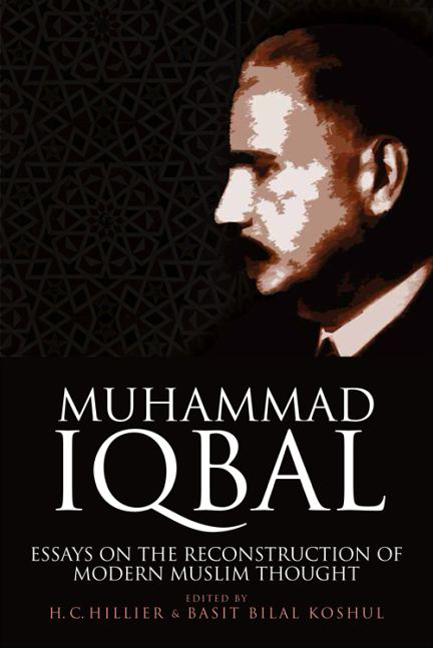Book contents
- Frontmatter
- Contents
- Preface
- 1 Introduction
- 2 The Human Person in Iqbal's Thought
- 3 Achieving Humanity: Convergence between Henri Bergson and Muhammad Iqbal
- 4 The Contemporary Relevance of Muhammad Iqbal
- 5 Pragmatism and Islam in Peirce and Iqbal: The Metaphysics of Emergent Mind
- 6 Between Hegel and Rumi: Iqbal's Contrapuntal Encounters with the Islamic Philosophical Traditions
- 7 Reconstructing Islam in a Post-metaphysical Age: Muhammad Iqbal's Interpretation of Immortality
- 8 Iqbal, Bergson and the Reconstruction of the Divine Nexus in Political Thought
- 9 Muhammad Iqbal: Restoring Muslim Dignity through Poetry, Philosophy and Religious Political Action
- Index
3 - Achieving Humanity: Convergence between Henri Bergson and Muhammad Iqbal
Published online by Cambridge University Press: 10 October 2017
- Frontmatter
- Contents
- Preface
- 1 Introduction
- 2 The Human Person in Iqbal's Thought
- 3 Achieving Humanity: Convergence between Henri Bergson and Muhammad Iqbal
- 4 The Contemporary Relevance of Muhammad Iqbal
- 5 Pragmatism and Islam in Peirce and Iqbal: The Metaphysics of Emergent Mind
- 6 Between Hegel and Rumi: Iqbal's Contrapuntal Encounters with the Islamic Philosophical Traditions
- 7 Reconstructing Islam in a Post-metaphysical Age: Muhammad Iqbal's Interpretation of Immortality
- 8 Iqbal, Bergson and the Reconstruction of the Divine Nexus in Political Thought
- 9 Muhammad Iqbal: Restoring Muslim Dignity through Poetry, Philosophy and Religious Political Action
- Index
Summary
French scholar of Islam Louis Massignon (1883–1962) has declared that a deep convergence, or what he labelled ‘a Semitic affinity’,1 existed between the philosopher Henri Bergson (1859–1941) and the Indian poet and thinker Muhammad Iqbal (1877–1938). More recently, in an important work entitled Being Human in Islam: The Impact of the Evolutionary Worldview, in a chapter devoted to ‘Bergson and the Muslims’, Damian A. Howard notes that ‘[r]ecognizably Bergsonian ideas subtend a great deal of what Iqbal says and Iqbal frequently refers explicitly to the thought of the Frenchman’ (2011: 59). He then raises the question of the nature of that Bergsonian presence in Iqbal's thought – a ‘catalyst’ he asks, ‘a hermeneutical key’, or ‘a confirmation’ – before concluding that at any rate ‘Bergson's own input was decisive in shaping Iqbal's theology’ and that ‘Iqbal's reading of Bergson made a decisive difference’ (ibid.; emphasis in original).
On the other hand, in Iqbal: An Illustrated Biography, Khurram Ali Shafique is altogether dismissive of the whole notion of a ‘contribution of Western philosophy to the thought of Iqbal’, which has been, according to him, ‘exaggerated’ (2007: 45). Declaring that Iqbal himself had a ‘condescending attitude towards Western philosophers’, citing Kant, Hegel, and Nietzsche, he notes that ‘Bergson received more courtesy’ just to add that this was ‘maybe because he was still alive’ (ibid.).
Shafique needs not be so anxious and defensive as to consider that any indication of the simple fact that Bergson's concepts of time, individuality, creative evolution, creative humanity, and mysticism are central to Iqbal's Reconstruction of the Religious Thought of Islam would signify ‘deference’ of the Indian philosopher to the Frenchman. To evoke an ‘affinity’ between the two philosophers is certainly not the same as to affirm that ‘a decisive input’ from Bergson ‘shaped’ Iqbal's thought.
- Type
- Chapter
- Information
- Muhammad IqbalEssays on the Reconstruction of Modern Muslim Thought, pp. 33 - 55Publisher: Edinburgh University PressPrint publication year: 2015

